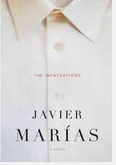“Fiction has the ability to show us what we don’t know and what doesn’t happen,” says Javier Diaz-Varela, one of the central characters in Javier Marias’ thought-provoking novel “The Infatuations.” As listeners of the podcast “Serial” learned, it can be impossible for an outsider to figure out what happened between two people. Separating what happened from what might have happened and what could have happened instead, or later, is the central thread of this deeply absorbing story.
Maria Dolz, in her mid-thirties, works in a Madrid publishing house. She stops at a cafe near her office for breakfast most mornings, where she regularly observes a couple sharing breakfast. She never meets or speaks with them but seeing them gets Maria’s day off to a hopeful start. Eventually there comes a day, or a series of days, when she notices they are missing. It turns out that the husband, Miguel Desvern, has been murdered, the victim of a random crime. Maria shrugs, mentally, until his wife, Luisa, returns to the restaurant several months later. They speak, they become acquainted, and it turns out that Luisa and Miguel had also noticed, and discussed Maria: they called her the Prudent Young Woman. One thing leads to another, and, through Luisa, Maria becomes acquainted with Diaz-Varela, Miguel’s best friend. Maria enters a light-hearted affair with Diaz-Varela who tells Maria a series of stories, from Balzac, from Dumas, about people who come back from the dead. Diaz-Varela also brings his friend to life for Maria.
One night she overhears something that leads her to wonder what role Diaz-Varela might have played in Miguel’s death. Another of the novel’s motifs is MacBeth’s lament on hearing of his wife’s death: “she should have died hereafter.” Diaz-Varela had reason to be happy his friend had died – a motive – and, over the course of a long conversation with Maria, sets out a plausible explanation for what she overheard. Was Miguel’s death a murder, nothing more? An execution? Something else? There are holes in Diaz-Varela’s story, and part of Maria’s battle with herself is what she will do with the information she has learned.
Maria narrates in the first person, and the novel is structured as a series of brief incidents, or even sentences in a conversation, followed by Maria’s detailed thoughts – sometimes she dissects what she’s seen or heard; other times she elucidates. She tells much of the story in flashbacks. All of the action is internal, yet the reader’s tension ratchets up as the story develops. Maria brings us with her, convincingly, even while we know that she’s failed to convince herself of the truth of Diaz-Varela’s narrative or the morality of her own actions. The story Diaz-Varela tells, and the novel itself, show us what we don’t know, and underline what we can’t. It’s an interesting parallel to “Serial” and considerably more persuasive. Do you agree? Let us know in the comments.
Have a book you want me to know about? Email me at asbowie@gmail.com. I also blog about metrics at asbowie.blogspot.com.

